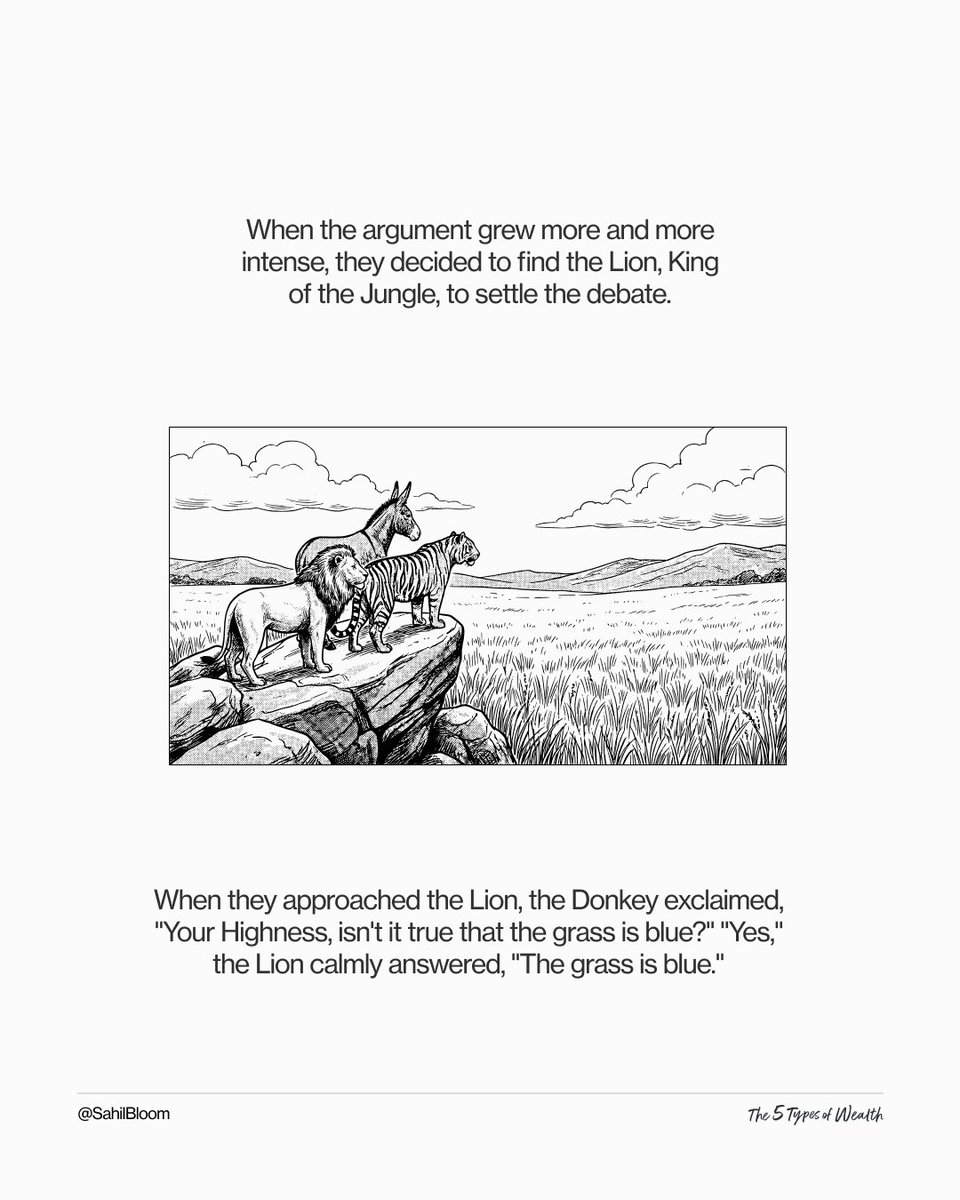To outperform, you need serious problem-solving skills.
Fortunately, these skills can be learned.
THREAD: A simple, powerful mental model for thinking clearly and solving complex problems:
Fortunately, these skills can be learned.
THREAD: A simple, powerful mental model for thinking clearly and solving complex problems:
When solving problems, the human mind is wired to think in linear, logical, forward terms.
But as the problems get increasingly complex, this forward, logical process often fails.
Enter our simple, powerful mental model: inversion.
But as the problems get increasingly complex, this forward, logical process often fails.
Enter our simple, powerful mental model: inversion.
What is inversion?
Inversion is a mental model and thinking tool used by some of the world’s greatest thinkers and problem solvers.
Simply put, it says that when problems become challenging to solve forwards, they may be more readily solved backwards.
Inversion is a mental model and thinking tool used by some of the world’s greatest thinkers and problem solvers.
Simply put, it says that when problems become challenging to solve forwards, they may be more readily solved backwards.
Inversion as a general thinking tool has been around for millennia.
Stoic philosophers had premeditatio malorum - “the pre-meditation of evils” - an exercise in which they would imagine the worst case scenario ahead of time.
It allowed them to make plans to avoid this outcome.
Stoic philosophers had premeditatio malorum - “the pre-meditation of evils” - an exercise in which they would imagine the worst case scenario ahead of time.
It allowed them to make plans to avoid this outcome.

The formal mental model was popularized by German mathematician Carl Jacobi in the mid-1800s.
When faced with difficult problems (which happened frequently in his field of elliptic functions!), he had a strategy: “Man muss immer umkehren.”
Translation: “Invert, always invert.”
When faced with difficult problems (which happened frequently in his field of elliptic functions!), he had a strategy: “Man muss immer umkehren.”
Translation: “Invert, always invert.”

Jacobi frequently used this strategy when stumped on a challenging math problem.
Rather than continuing to look at it the same way (forwards), he would restate it in inverse form (backwards).
This new, creative perspective often allowed him to solve the problem more easily.
Rather than continuing to look at it the same way (forwards), he would restate it in inverse form (backwards).
This new, creative perspective often allowed him to solve the problem more easily.
Inversion went mainstream when Charlie Munger made one classic remark:
“All I want to know is where I’m going to die, so I’ll never go there.”
Munger realized that forward, logical thinking can only take you so far.
To solve certain problems, you have to think differently.
“All I want to know is where I’m going to die, so I’ll never go there.”
Munger realized that forward, logical thinking can only take you so far.
To solve certain problems, you have to think differently.

Inversion is just that: a method for thinking about a problem differently.
It requires you to look at things from a different angle to embrace a new perspective.
Just as the captain surveys the battlefield for a new vector of attack, you too have to uncover a novel approach.
It requires you to look at things from a different angle to embrace a new perspective.
Just as the captain surveys the battlefield for a new vector of attack, you too have to uncover a novel approach.
Perhaps more importantly, inversion trains your mind to think dynamically.
Athletes have long known that training in a single plane leads to stasis.
The same principle applies to the mind.
Inversion trains it from multiple angles.
But how/where can you apply it in practice?
Athletes have long known that training in a single plane leads to stasis.
The same principle applies to the mind.
Inversion trains it from multiple angles.
But how/where can you apply it in practice?
Inversion in Investing
Warren Buffett famously stated that there were only two rules of investing:
"Rule #1: Never lose money. Rule #2: Never forget Rule #1."
Buffett and Charlie Munger often evangelize the benefits of simply avoiding stupidity vs. seeking brilliance.
Warren Buffett famously stated that there were only two rules of investing:
"Rule #1: Never lose money. Rule #2: Never forget Rule #1."
Buffett and Charlie Munger often evangelize the benefits of simply avoiding stupidity vs. seeking brilliance.

Achieving long-term outperformance is extremely challenging.
(Note: If anyone tells you otherwise, you should run in the other direction!)
Applying inversion, rather than solving for how to achieve outperformance, try solving for how to achieve underperformance.
(Note: If anyone tells you otherwise, you should run in the other direction!)
Applying inversion, rather than solving for how to achieve outperformance, try solving for how to achieve underperformance.
What type of behaviors, thought patterns, and decisions would effectively guarantee you underperform the market?
Said differently, how do you guarantee you break Buffett's Rule #1?
Once you've answered that, you may find it easier to craft a strategy for outperformance.
Said differently, how do you guarantee you break Buffett's Rule #1?
Once you've answered that, you may find it easier to craft a strategy for outperformance.
Inversion in Business
For most startups and businesses, defining and executing against a strategy to drive durable, long-term growth is the primary priority.
But in a high-stakes, competitive market, deciding on the "right" strategy is incredibly difficult.
Inversion can help.
For most startups and businesses, defining and executing against a strategy to drive durable, long-term growth is the primary priority.
But in a high-stakes, competitive market, deciding on the "right" strategy is incredibly difficult.
Inversion can help.
Conduct a pre-mortem analysis (your own "premeditatio malorum") of the different strategies and levers.
For a given strategy, ask a few questions:
If this were to fail, why did it fail?
How might we have avoided this failure?
What are the consequences of this failure?
For a given strategy, ask a few questions:
If this were to fail, why did it fail?
How might we have avoided this failure?
What are the consequences of this failure?
If you perform this exercise across the various considered strategies for your startup or business, the answer of which strategy to pursue will (likely) come into clear view.
It can be a very helpful exercise for cutting through the noise and making quick, effective decisions.
It can be a very helpful exercise for cutting through the noise and making quick, effective decisions.
Inversion in Leadership
There are countless books on how to be an effective leader.
But when you're dropped into a new context and asked to lead, books only take you so far.
A new situation requires a new approach to leadership.
So how do you lead?
Just invert the problem.
There are countless books on how to be an effective leader.
But when you're dropped into a new context and asked to lead, books only take you so far.
A new situation requires a new approach to leadership.
So how do you lead?
Just invert the problem.
Ask yourself a few key questions:
How would I fail to lead?
How would I fail to garner the respect of my team?
If I were a team member, what would really piss me off about this new leader?
Thinking about the problem differently (backwards!) will lead you down the right path.
How would I fail to lead?
How would I fail to garner the respect of my team?
If I were a team member, what would really piss me off about this new leader?
Thinking about the problem differently (backwards!) will lead you down the right path.
Inversion in Relationships
Human relationships are arguably the most complex "problem" in nature.
How do you foster a strong, healthy relationship?
Flip this on its head: what would ruin this relationship?
Avoid those behaviors or actions!
It's not perfect, but it's a start.
Human relationships are arguably the most complex "problem" in nature.
How do you foster a strong, healthy relationship?
Flip this on its head: what would ruin this relationship?
Avoid those behaviors or actions!
It's not perfect, but it's a start.
Inversion is a very simple mental model, yet as these varied examples have shown, it is dynamic, powerful, and useful across a range of situations.
Enjoy this post? Follow me @SahilBloom for more writing on mental models and business.
And remember: Invert, always invert.
Enjoy this post? Follow me @SahilBloom for more writing on mental models and business.
And remember: Invert, always invert.
I will be turning this thread into a longer-form piece for my newsletter, where I will explore and cover these topics in greater depth.
The piece will be released in the coming days.
Subscribe below so you don’t miss it! sahilbloom.substack.com
The piece will be released in the coming days.
Subscribe below so you don’t miss it! sahilbloom.substack.com
And if you are a job seeker looking to leverage inversion and other problem-solving skills to advance your career, check out my curated job board, where I share unique roles at high-growth companies in finance and tech.
New roles added every single week! pallet.xyz/list/thebloomb…
New roles added every single week! pallet.xyz/list/thebloomb…
Newsletter piece (+ audio recording for ease of consumption!) on inversion will hit inboxes tomorrow.
Sign up today so you don’t miss it! sahilbloom.substack.com
Sign up today so you don’t miss it! sahilbloom.substack.com
Invert, Always Invert
The newsletter is now live in your inboxes and ears! Please enjoy, share, and subscribe if you aren’t already! sahilbloom.substack.com/p/invert-alway…
The newsletter is now live in your inboxes and ears! Please enjoy, share, and subscribe if you aren’t already! sahilbloom.substack.com/p/invert-alway…
• • •
Missing some Tweet in this thread? You can try to
force a refresh






















